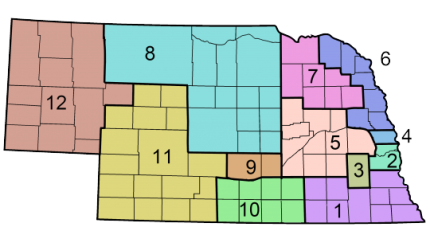District Court
The district courts are Nebraska’s general jurisdiction trial courts. This means that with a few exceptions, civil and criminal cases of all types may be commenced in and tried by the district courts. District courts also function as appellate courts in deciding appeals from various administrative agencies and from most county court cases. When acting as an appellate court, a district judge reviews the record of testimony and evidence from the county court or administrative agency in order to rule on the appeal.
Clerks of the District Courts
The Clerk of the District Court is a uniquely elected position in that the Clerk is not only answerable to the voters but is also under the direct supervision and direction of the District Court. See Neb. Rev. Stat. § 25-2214; see also State v. Le Fevre, 25 Neb. 223, 41 N.W. 184, 185 (1888). Clerks of the District Courts perform vital and essential court functions in following the directives of the District Court and performing administrative functions for the benefit of the District Court and the citizens of the county. Each county in the State of Nebraska has a clerk of the district court. Nebraska law states that counties with 7,000 inhabitants are required to have a clerk of the district court elected by the voters. In counties with less than 7,000 inhabitants, the county board and district judge determine whether there should be a clerk of the district court. If the position of clerk of the district court does not exist in the county, the county clerk is the ex officio clerk of the district court. Besides being the clerk of the district court, he or she also serves as the court’s administrative officer.
Clerks of the District Courts perform an important role in the efficient and orderly operation of the District Court. Pursuant to Nebraska Supreme Court Rule § 6-1512, Clerks of the District Courts have the following duties:
- The clerk of the district court shall be present at all times during the sessions of the court, either in person or by deputy, unless excused by the court.
- The clerk shall prepare and maintain such dockets and records as may be required by the court, Supreme Court rule, or the statutes of Nebraska.
- The clerk shall have the following duties in addition to all statutory duties, if so directed by the court:
- The clerk shall immediately, upon receipt, notify the court and sheriff of the return of any mandate from the Nebraska Supreme Court in every criminal case, and notify the court in every civil case.
- The clerk shall have such other and additional duties, not inconsistent with the responsibilities of the office, as may be directed by the court.
The Clerk of the District Court is not a constitutional office; in counties having a population of seven thousand inhabitants or more it is an elected position under state law. See Neb. Rev. Stat. § 32-524. As such, there are statutory and residency qualifications for this position.

